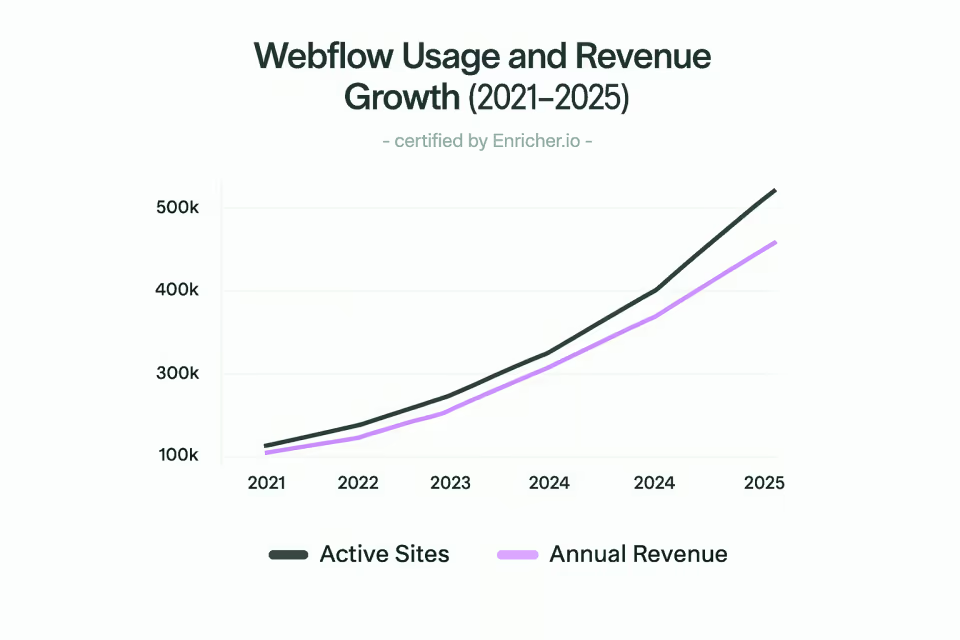Introduction: The New Reality of Web Design
In the past, launching a professional website required large budgets, lengthy timelines, and a dedicated development team. By 2025, that model has been disrupted by no-code platforms that allow businesses to launch sophisticated websites in days instead of months.
Among these platforms, Webflow has emerged as the preferred choice for startups, SaaS companies, agencies, and even enterprise clients — combining design flexibility, technical performance, and scalability.
This article explores five key reasons Webflow has become the dominant platform for launching digital businesses in 2025.
1. Market Momentum: Webflow’s Rapid Growth
Webflow’s adoption has accelerated dramatically over the past four years. As of 2025, it powers 493,226 active websites — a 42% increase since 2023 (Enricher.io).
According to W3Techs, it now holds a 1.2% share of the CMS market, more than doubling its presence since 2021.
From a business perspective, Webflow is equally impressive: $213 million in revenue in 2024 (a 66% YoY increase) and a $4 billion valuation (Crunchbase).
These figures highlight not just popularity, but a proven, sustainable business model that reassures clients of the platform’s long-term stability.

Webflow usage and revenue growth from 2021–2025
2. Design Freedom with Professional-Grade Code
One of the biggest advantages of Webflow is that it bridges the gap between drag-and-drop simplicity and developer-level control.
Designers can create pixel-perfect layouts using CSS Grid, Flexbox, and fully custom animations — without writing code. At the same time, the platform outputs clean HTML, CSS, and JavaScript suitable for production use (TechRadar).
For agencies and in-house teams, this means you can achieve a highly customized design while keeping the build process efficient and scalable.
📷 Image Placeholder: Screenshot of Webflow Designer showing advanced animation panel
3. Built-In CMS and SEO Advantages
For content-heavy businesses, Webflow’s content management system (CMS) offers a level of flexibility unmatched by many competitors. Marketing teams can manage blogs, case studies, and product catalogs without involving developers, speeding up content deployment.
On the SEO side, Webflow comes with native features like:
- Automatic sitemap generation
- Schema markup support
- Meta tag customization
- 301 redirect management
These built-in capabilities often require multiple plugins on other platforms (Webflow SEO), making Webflow an efficient choice for growth-focused businesses.
4. AI-Powered Site Building
In early 2025, Webflow introduced its AI Site Builder (beta), which allows users to generate complete, responsive websites from a simple text brief. The AI Assistant goes further, suggesting content sections, improving layouts, and even generating placeholder copy.
According to Shadow Digital, this can reduce the initial design and development phase by up to 60%. For startups and SaaS companies aiming to launch quickly, that’s a massive competitive advantage.
5. Real-World Business Impact: Lattice Case Study
HR SaaS platform Lattice provides a clear example of Webflow’s benefits. Before migrating, their marketing team depended on developers for website changes — slowing campaign rollouts.
Post-migration to Webflow:
- Landing pages could be updated in hours, not weeks
- Page speed improved by ~25%
- Marketing gained complete control over content and SEO settings
This agility has allowed Lattice to respond faster to market changes and run more targeted campaigns without increasing development resources.
Conclusion: Why Your Next Website Should Be on Webflow
Webflow has evolved from a designer’s niche tool to a full-scale digital platform that supports rapid launches, robust content management, and enterprise-grade scalability.
For startups, SaaS companies, and agencies, Webflow offers:
- Faster time-to-market
- Lower maintenance costs
- Greater design flexibility
- Integrated SEO and CMS tools